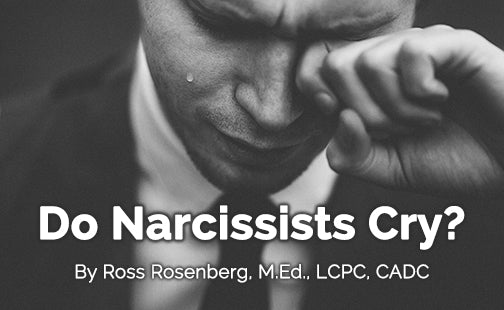
To answer the question, “do narcissists cry?,” it is first necessary to move beyond the catch-all, nondescript, generally used terms and embrace the recognized diagnostic terms used by most professional mental health practitioners. To this end, in my book, “The Human Magnet Syndrome: The Codependent Narcissist Trap,” I coined the term “Pathological Narcissism” to represent three Personality Disorders that are identified as having core narcissistic traits: Narcissistic Personality Disorder (NPD), Borderline Personality Disorder (BPD), and Antisocial/Sociopathic Personality Disorder (ASPD).
In my expert opinion, Pathological Narcissists definitely cry, sometimes a lot! Perhaps the better questions to ask are the following:
- For what (internal and external) reasons does a person with NPD, BPD, or ASPD cry?
- What consequence causes a person with NPD, BPD, or ASPD to cry?
- Is the expression of tearful affect (behavioral description of crying) a natural emotional/physical reaction to an external event?
- Like a believable actor, is it contrived for a manipulative purpose?
Narcissistic Personally Disorder/NPD
People with NPD cry when their unconsciously hidden (from them) core shame is activated, which is often the case when held accountable for their actions and suffer a humiliating/shaming/relationship-ending consequence, i.e., divorce, losing custody of children, job termination, etc.
Borderline Personality Disorder/BPD
People with BPD cry when they perceive (accurately or not) any action from a beloved person interpreted as abandonment. In situations like a relationship breakup, or a statement indicating that they made a mistake, the person with BPD will exhibit a torrential expression of tearful affect and highly vocal (and noticeable) versions of crying. Such crying is almost always followed-up with secondary vindictively motivated punishing reactions/actions.
Antisocial Personality Disorder/ASPD
People with ASPD cry when they are subjected to painful consequences for their sociopathic driven actions. Even though they lack empathy and remorse for other people, they feel emotions, especially the ones activated by:
- Getting, or not getting, what they need/want/desire
- Getting caught trying to manipulate others to get what they need/want/desire
- Facing consequences for their unacceptable actions/behavior
A specific example: A person with ASPD is exposed and sentenced to prison or the consequences of their actions result in the loss of freedom, financial support, and/or ability to be independent.
It is important to point out that the absence of tearfully expressed emotions or crying does not reflect any pathologically narcissistic disorder. Rather, it is an evolution-based human response to painfully upsetting consequential internal or external events.
Even people with ASPD, who are understood to have shallow and, in some cases, absent emotions, especially empathy and remorse, will cry if they lose everything they manipulatively and dishonestly accumulated for themselves—no different from a dog, monkey, or porpoise. All higher-level mammals (including humans) experience some form of behaviorally observed and emotionally inferred crying response when experiencing some form of physical or emotional pain, including loss, grief, capture, injury, etc.
The Exceptions
One of the few exceptions to the above assertion that all people cry is individuals suffering from specific internal or external trauma, for which the brain/mind determines the best line of defense requires the severing of emotions. In mental health terms, this process is referred to as dissociation. Dissociation is the primary symptom of Dissociative Disorders. It is a secondary symptom of several mental illnesses, including, but not limited to Schizophrenia or similar mental health disorders. These include symptoms often described as no or blunted affect or, in extreme cases, catatonia.
External causes include pervasive poverty, physical suffering, chronic/ongoing trauma, and other situations that naturally provoke an immediate/real-time or delayed dissociative affective response. In addition, high levels of psychoactive medication or recreational drugs can cause the blunting of affect.
In conclusion, narcissists definitely cry. Although this is far from an exhaustive/complete response to the initial question, I am hopeful it will be useful to you.
Read the full article, "Do Narcissists Cry?", by UpJourney at https://upjourney.com/do-narcissists-cry.

Must-know information about
Pathological Narcissism
& Narcissist Abuse.
Learn more.
About Ross
Ross Rosenberg M.Ed., CADC, is Self-Love Recovery Institute’s CEO and primary contributor. His internationally recognized expertise includes pathological narcissism, narcissistic abuse, and attachment trauma. Ross’s “Codependency Cure™ Treatment Program provides innovative and results-oriented treatment.
Ross's expert educational and inspirational seminars have earned him international acclaim, including his 23 million YouTube video views and 234K subscribers. In addition to being featured on national TV and radio, his “Human Magnet Syndrome” books sold over 150K copies and are published in 12 languages. Ross provides expert testimony/witness services.
More about Ross and his educational and inspirational work can be found at www.SelfLoveRecovery.com.
Join us on Facebook, Instagram, Twitter, and now TikTok!
https://www.facebook.com/TheCodependencyCure
https://www.instagram.com/rossrosenberg_slri
https://www.twitter.com/rossrosenberg1
https://www.tiktok.com/@rossrosenberg1


0 comments